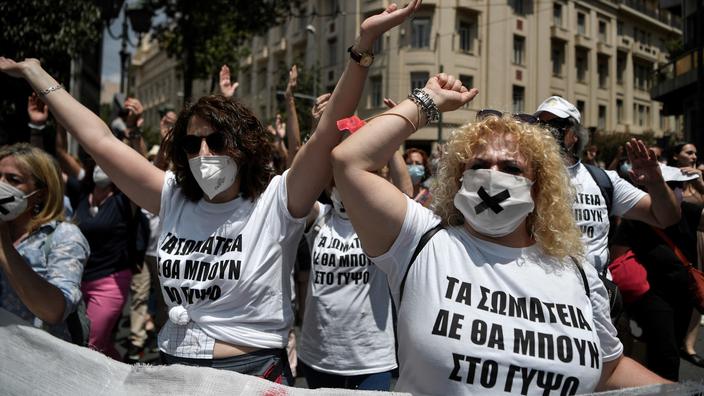Rebelote in the streets of Athens, with new events taking place this Wednesday, June 16 in the capital.
These take place on the sidelines of the second review of the labor law.
Greek Prime Minister Kyriakos Mitsotaki is facing a challenge from unions and opposition parties, standing up to the proposals put forward by the government.
The far left Syriza party likens it to a "
monstrosity
", causing Greece to regress towards the "
19th century
".
Read also: Greece: strikes and demonstrations against labor law reform
The labor law advocated by the executive aims to reform a system that the government considers obsolete and unsuitable. The prime minister said the reform was "
deeply pro-growth
" while aligning with European standards. In addition, it would bring "
transparency
" to union processes. His detractors, and in particular the secretary general of the Communist Party, Dimitris Koutsoumbas, see it differently, accusing him of legalizing a kind of “
jungle
” in the workplace where employees will be “
totally defenseless
”.
Concretely, this labor law aims to adapt to recent developments which are reshaping the world of work and to make the country more competitive.
Among the flagship articles of this proposal is the authorization of the 10-hour day, allowing workers to adapt their week to their liking.
We also note the extension of parental leave from 10 to 14 paid days, the stricter formalization of rules governing teleworking or even the increased prevention of sexual harassment.
Greek tourism holds its breath
It also disrupts the strike system, by imposing on the one hand a minimum service in the public service.
On the other hand, the new regulations involve unions more closely in the event of a breach of the rule because they become criminally responsible, and may be fined in the event of an interruption of services.
The demonstrations in the context of the challenge of this bill have therefore increased since last Thursday.
In Thessaloniki they were 10,000 to demonstrate and in Athens 16,000. Other rallies took place this Wednesday early in the morning in the capital, where according to the police there were 7,000 demonstrators.
Another rally is scheduled for the end of the day in front of Parliament.
This discontent has also materialized by the temporary stopping of public transport in Athens and ferries serving the Greek islands for 24 hours. This strike movement is notably organized by the Confederation of Greek Workers (GSEE) and the Athenian Labor Center (*). They are also at the origin of the demonstration which took place in Piraeus, the main port of the city.
This wind of protest is causing great concern among Hellenic tourism players.
A tenant of apartments and villas on the island of Hydra tells us that he "
will not be able to last one more season if the ferries do not work at full capacity
".
Weakened by the Covid-19 epidemic, businesses, hotels and seasonal workers are counting on the summer to take advantage of the surge in tourists.
This sector remains vital for the local economy, having generated a turnover of more than 18 billion euros in 2019.
(*) The actors behind this strike movement include ADEDY, PAME, the Confederation of Greek Workers (GSEE), the Athenian Labor Center.

